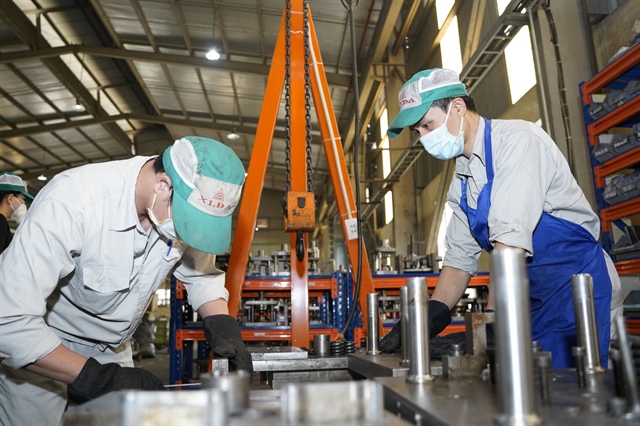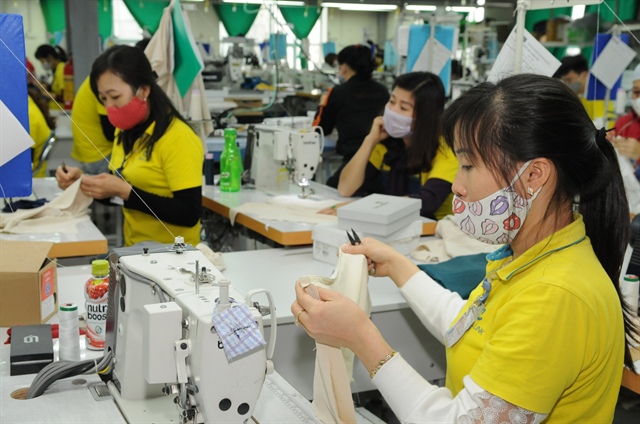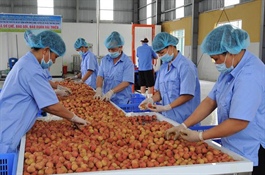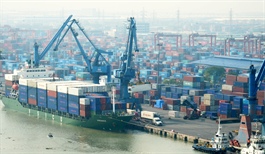Support industries urged to strive for self-sufficiency
Support industries urged to strive for self-sufficiency
The Ministry of Industry and Trade (MoIT) has adopted a strategy to enhance the self-sufficiency of the country’s support industries in order to reduce the dependence on imports and thereby improve product competitiveness in global value chains.
Low added value
A report by the MoIT’s Industry Agency indicates that underdeveloped support industries result in a heavy dependence on imported components and raw materials. This, in turn, has created a trade deficit for Vietnam in recent years due to high imports of input materials for production, resulting in low added value of domestic industrial products.
The Industry Agency said that in recent years, the manufacturing and processing industries accounted for nearly 40 percent of total production and trade net revenues but contributed a mere 14 percent to Vietnam’s gross domestic product (GDP), with much lower added value compared to other industries.

Sustainable industrial development requires self-sufficiency in raw materials, components and accessories |
According to data compiled by the Organization for Economic Cooperation and Development (OECD), external added value accounted for a higher percentage of total added value of Vietnamese exports over the past five years compared with domestic added value. For instance, while textiles, garments and electronics are major export products, their domestic added value accounts for only 50 percent and 37 percent, respectively. An evaluation of the COVID-19 impact on domestic manufacturing industries paints a clear picture of their limitations due to high dependence on foreign supply chains.
These shortcomings affect domestic production development and economic growth in the short and long term in the context of deeper international integration. “Therefore, developing support industries towards self-sufficiency in materials, components and accessories is key to sustainable industrial development in the long term,” a representative of the Industry Agency emphasized.
Developing domestic value chains
In this context, the Industry Agency is urging enhancement of the support industries’ capabilities, creating opportunities for Vietnamese support industry enterprises to become suppliers and join in the supply chains of end product manufacturing and assembly firms.
|
Deputy Minister of Industry and Trade Do Thang Hai said that to improve the ability of support industry enterprises, Vietnam needs to develop domestic processing and manufacturing industries. However, the state also needs to expand foreign markets for domestic support industry enterprises, enabling them to access foreign technical processes and production skills to improve manufacturing capability.
Besides, Hai added that Vietnam should also accelerate the construction of concentrated support industry zones to create industry clusters, develop materials manufacturing industries for self-sufficiency in input materials for production, and reduce the dependence on material imports to enhance the competitiveness of Vietnamese products in global value chains.
Truong Thi Chi Binh, Vice President of the Vietnam Association for Supporting Industries (VASI), proposed that the government issue a law on support industries and a law on industrial development, and apply specific policies to attract foreign investment in these fields.
The MoIT will provide support for the construction and development of an ecosystem for enterprises producing and supplying high-tech products. The ministry will also develop high-tech and high value-added services to advance high-tech support industries.
| Resolution 115/NQ-CP on development of support industries sets out a goal for support industry products to meet 70 percent of the domestic production and consumption by 2030, accounting for 14 percent of industrial production value. It also envisions about 2,000 enterprises being capable of supplying directly to assembly firms and multinational corporations in Vietnam. |
























